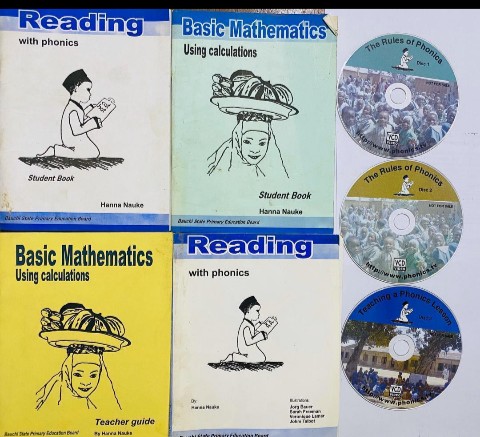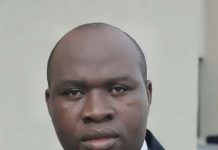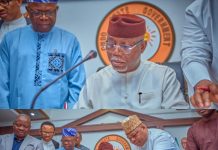
The Northern child’s decades of struggle with reading English is coming to an end soon with a very comforting development from Bauchi.
In what I consider as a major step in solving the fundamental problems associated with primary education, the Bauchi State Governor, Senator Bala Abdulkadir Mohammed, has approved, as a state policy, the adoption of Phonics as the method of teaching how to read English in the entire State. Hitherto, the use of Phonics in public schools was only limited to some few schools in the State.
This step may seem small but few other measures can turn the fortunes of education in Northern Nigeria like the adoption of Phonics. The Northern child has been alienated for long in the evolution of primary school English curriculum in this country. The textbooks used for long are meant for children who already have sufficient English vocabulary. From the Oxford English Course textbooks that we used in Class 1 in the 1960s to the Primary 1 texts used today, it is evident from the first page that the presumption is that the child has an idea of English or in fact speaks English. A child from Southern Nigeria has an advantage here, but his counterpart in any Northern public school is completely virgin.
Illustration
Let me illustrate this with the first page in Macmillan Brilliant Primary English, Book 1 (See picture). It has a table of four columns for Animal, Picture, Sound/Noise and Form a Sentence. The names of three animals, dog, cat and cow were written, followed by their pictures, then the name of their sounds (barks, mews, moos) and then sentences: A dog barks, a cat mews and a cow moos.
Imagine this to be the first reading lesson for a Northern child in the primary school. All he will understand are the pictures. So how can he read the words beside them? A Southern child at least has the advantage of knowing from his spoken English, no matter how distorted it is, the names of dog, cat and cow, and hence can connect the pictures and the writing. He does not have to learn that from the teacher.
The Northern child that did not go to nursery, and is the predominant species, has to learn that from the teacher and the book because English is completely absent from his sociology. It is always Hausa or his mother tongue wherever he or she goes outside the classroom. In addition, the Queen’s Primer has been in use in the South for long and but restricted only to few private schools in the North. No wonder, there are thousands of Northern children at JSS 3 who cannot even read this Primary I textbook. (Gosh! My task is to solve this problem, among others. Do not envy me please)
The problem is compounded by the absence of Northerners among authors of school texts in Nigeria. The authors of the above referred Macmillan Book 1 are Ayo Ogunsiji, Victoria Alabi, Moji Olateju, Ibrahim Olaosun, Olu Adeyemi, Augustina Onwubiko and, perhaps to give it a national outlook, Hassan Abdullahi.
Reading First
Without ability of the child to read, his portion in education of any kind is nil. That is why in Koranic school, it is reading first, nothing else. Once a child can read, the ocean of knowledge is there right before him to explore. The result has been fantastic for at least 1000 years in Northern Nigeria. Once the child remains for few months in the Koranic school, his ability to read is guaranteed and if he persists, he soon covers the entire Koran including its writing, and even memorize it before he moves to the literature of other fields.
This is the method adopted in adult education throughout the Northern States for almost a century now. Hausa being an 100 percent phonetic language, unlike English, can be read easily, in a systematic way, like Arabic.
The absence of a systematic method, before the arrival of Phonics, makes teaching the reading of English difficult. When class sizes were few, teachers more dedicated and better school organization, infrastructure and instructional materials, like up to the mid-1970s, teachers, children and parents managed to get around the problem, albeit with a lot of difficulty. I asked a number of graduates in their late 20s and early 30s in a WhatsApp group to tell me how they learnt how to read English and all the answers indicated that the breakthrough came outside the classroom from a brother, sister, mother, or the extra-effort of a teacher.
Today, we have millions of children spending nine years of basic education without any ability to read even simple words. The ability to read simple words and sentences among primary school children in Northern Nigeria according to a 2013 RARA survey was 1.4%. Bauchi scored 3% then. It means 97% of our public school children could not read simple words then. How we expect them to learn anything in the Junior or senior secondary school?
Phonics, a modern, systematic way of teaching how English is read using letter sounds in UK, USA, Canada, Australia, Europe and modern schools everywhere, solves this fundamental problem. It teaches a child the sound of letters first, not their names, and goes on to take it through the different blending and exceptions. In the past 20 years, I have leant to use it on children and almajirai, it takes just few lessons to make a breakthrough. It is one of the secrets behind the success of my Millennium Academy Primary School here.
The Journey
The adoption of Phonics has been a 20 years old journey, from the arrival of Mr. Trevor Hearfield at our Millennium Academy in Tilden Fulani to two days ago when I received His Excellency’s approval for its statewide adoption. In late 2004, as Adviser on Education to Governor Muazu I got approval for SUBEB to undertake intensive English program in which training teachers on Phonics was a major component. I travelled with Hanna Nauke to UK to source materials that she used to reduce everything to a simple 125 page book (printed at the cost of N160 currently) which can be used by young adults. It was published in 2005 and 1,300 teachers were trained. That year, we introduced it in JIbril Aminu, Tambari and BSADP primary schools which were under my management. Thousands of copies of the books were distributed in 2006 to LEAs but the change of government in 2007 stalled everything.
A number of agencies and individuals later independently introduced Phonics in their intervention. BESDA/NEIplus for example have been using it in a number schools and some local governments in the State. Of course, it formed a conspicuous part of my Blueprint before my appointment as Commissioner. As soon as I assumed office last September, I started preparation for its statewide adoption, with the appointment of the chief master-trainer earlier produced by Hanna Nauke, Malam Adamu Saad, as a desk-officer in the Ministry for the project. He reviewed the video produced by Hanna and blended it with another from his two weeks demonstration class with local pupils at Tilde who have no idea of reading English at all. He then cut the videos into clips covering schemes for use by primary school teachers who will receive it weekly via WhatsApp.
The Blue Sky Future
With the approval now on the one hand and Hanna’s books, USAID/NEIplus and Adamu’s clips on the other, we will soon make a breakthrough in Bauchi State, God willing. We will take all necessary measures to see that Phonics has spread to every class, that “Reading First” strategy is adopted along with early language skills, with all that it takes for training of teachers and spreading the gospel through modern technology. I have already intimated Rayyan the good Samaritan son to write an Application that will freely make these and other materials available to our teachers and the public via phones and computers.
So our materials will also be available to all interested individuals, schools and governments. Once our children can read, the would hold the most vital tool of education and the extent they will put it to use will be limitless. They can then see words like dog, cat and cow, read them and relate them with their pictures in textbooks. Only then can they make sentences. Only then will their textbooks make sense. With reading, English language becomes easier, and so is mathematics and other subjects. They can dive into the ocean of knowledge without limits.
The approval means that officially every school in Bauchi State must ultimately adopt Phonics as the method of teaching reading in English. It is not optional but compulsory when all necessary preparations have been made for its successful takeoff and compliance in the next one year or so. So important it is that I am already thinking of establishing a centre of phonics in the State where all works and trainings on Phonics will take place. The Chevron building at GHUKUC will be ideal for that, if the idea is accepted by other stakeholders.
Alhamdulillah. With no political or administrative obstacles from the Governor, we are starting to knock down the major obstacles that impede delivery, one after the other. With improved teacher and child attendance, and now phonics, other things, like spoken English, teacher qualification, etc will follow, each at its right time. In few years the progress in education delivery will be evident, God willing.
Dr. Aliyu U. Tilde
Commissioner
Ministry of Education
Bauchi State















